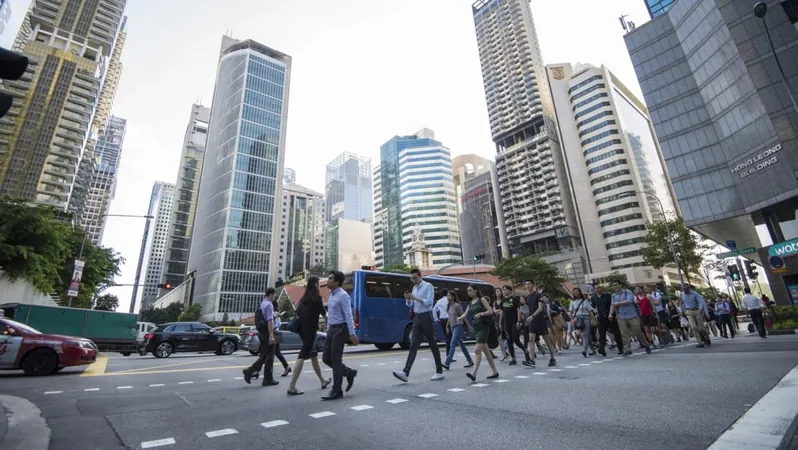
Singapore's Economy Grows 4.3% in Q4 2024: What It Means for the Future!
2025-01-02
Author: Li
However, the full-year GDP growth for 2024 hit 4%, a significant improvement from the sluggish 1.1% in 2023. Prime Minister Lawrence Wong heralded the growth in his New Year message, emphasizing that many Singaporean workers benefitted from wage increases that outstripped inflation—a positive sign for household prosperity.
Upgraded Growth Forecast
In November 2023, Singapore had upgraded its growth forecast to approximately 3.5%, surpassing previous expectations. According to OCBC's chief economist, Selena Ling, this annual growth rate marks the highest level since 2021, exceeding both official estimates and general market expectations. Ling highlighted that this growth was broad-based, with upward revisions in the first and second quarters indicating a strong economic trajectory.
Cautious Outlook for 2025
Despite these positive indicators, the outlook for 2025 remains cautious. Ling cautioned that external factors, including potential new tariffs under a possible Trump 2.0 administration and ongoing geopolitical tensions, could pose challenges that may inhibit growth. OCBC has revised its 2025 growth forecast down from 2.7% to 2.2%, acknowledging the higher comparison base set in 2024.
Sector Performance
Barclays economist Brian Tan shared a similar sentiment, noting that while Singapore enters 2025 on solid ground, there are signs the economy may be nearing a peak. He indicated that the ultra-open nature of Singapore's economy makes it susceptible to global trade tensions, which could create hurdles for future growth.
Highlighting sector performance, the construction sector surged by 5.9% in Q4, supported by increased public sector construction activity. The wholesale and retail trade and transportation sectors also showed vigorous growth of 5.6%. However, on a quarter-on-quarter basis, the economy grew by only 0.1%, a significant drop from the 3.2% growth reported in Q3.
The manufacturing sector saw a slower growth rate of 4.2% in the fourth quarter, down from 11.1% only a few months prior. Notably, the growth was heavily influenced by increases in electronics and transport engineering output.
Tan mentioned that the electronics sector remains a bright spot, particularly as the artificial intelligence boom continues to revitalize the semiconductor market.
The services sector, comprising wholesale and retail trade, along with transportation and storage, also expanded. Statistics indicated that while these sectors together grew 5.6%, they faced a slight contraction of 0.2% on a quarter-on-quarter seasonally adjusted basis.
Conclusion
In summary, 2024 proved to be a blockbuster year for Singapore's economy with remarkable resilience and diverse growth across several sectors. Nonetheless, uncertainties loom on the horizon, and stakeholders will be keenly monitoring both local and global developments as they navigate a potentially challenging 2025. Will Singapore maintain its growth momentum, or will external pressures cause a slowdown? Only time will tell!


 Brasil (PT)
Brasil (PT)
 Canada (EN)
Canada (EN)
 Chile (ES)
Chile (ES)
 España (ES)
España (ES)
 France (FR)
France (FR)
 Hong Kong (EN)
Hong Kong (EN)
 Italia (IT)
Italia (IT)
 日本 (JA)
日本 (JA)
 Magyarország (HU)
Magyarország (HU)
 Norge (NO)
Norge (NO)
 Polska (PL)
Polska (PL)
 Schweiz (DE)
Schweiz (DE)
 Singapore (EN)
Singapore (EN)
 Sverige (SV)
Sverige (SV)
 Suomi (FI)
Suomi (FI)
 Türkiye (TR)
Türkiye (TR)